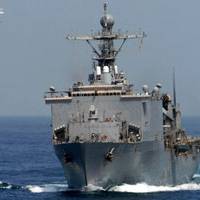NAVSEA Increases Wasp-class Fuel Efficiency
The U.S. Navy began installing combustion trim loop systems this month on amphibious ships to improve fuel efficiency and save up to 2,400 barrels of fuel per ship annually. The Naval Sea Systems Command (NAVSEA) tested system, coupled with a new stack gas analyzer, automatically optimizes the fuel-air mixture for the ships' two boilers, making them more efficient. The trim loop system also protects the environment and increases crew safety by automatically preventing black or white smoke conditions. This initiative, part of NAVSEA's Fleet Readiness Research & Development Program (FRR&DP), supports the secretary of the Navy's efforts to reduce total energy consumption on naval ships.
Navy Stern Flap Installations for Fuel Savings

The U.S. Navy began installing stern flaps in April on amphibious ships in an effort make ships more fuel efficient and save up to $450,000 in fuel costs per ship annually. USS Whidbey Island (LSD 41), the first dock landing ship to receive stern flaps, began the installation process mid-April during a scheduled maintenance availability in Norfolk, Va. The ship is expected to head back to sea in late November. "A stern flap, located on the aft end of a ship, makes the ship more hydrodynamic…
US Navy Working to Lower Ships’ Fuel Costs
The rewards reaped from the Navy's Energy Conservation (ENCON) Program save millions in fuel costs, while keeping ships at sea to support the nation's Maritime Strategy. ENCON includes two major energy conservation and management programs spearheaded by Naval Sea Systems Command (NAVSEA) in One is the Incentivized Energy Conservation (i-ENCON) Program; the other is the Fleet Readiness, Research and Development Program (FRR&DP). According to i-ENCON Program Manager Hasan Pehlivan, the programs are projected to save more than 1.14 million barrels of oil in 2008, enough to fill four million 12-gallon car gas tanks, resulting in a record cost avoidance of more than $157 million.









